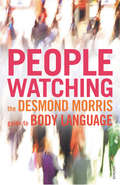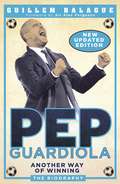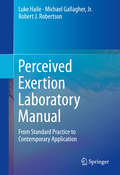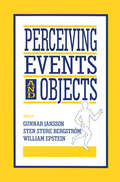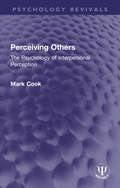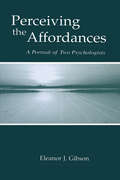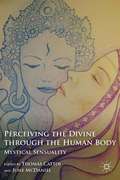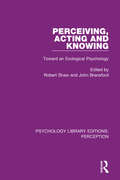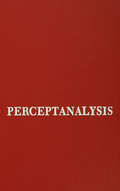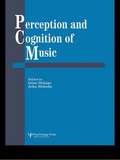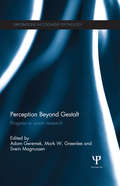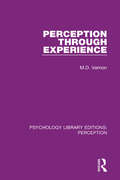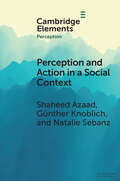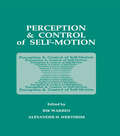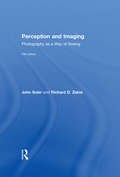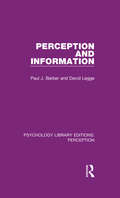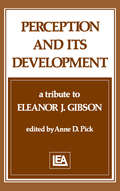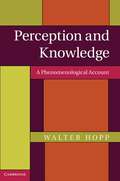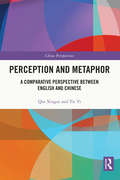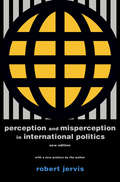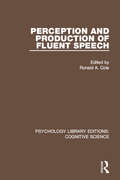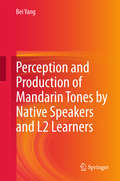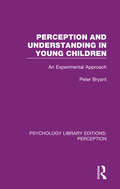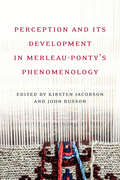- Table View
- List View
Peoplemaking
by Virginia SatirAll of the ingredients in a family that count are changeable and correctable - individual self-worth, communication, system, and rules - at any point in time. Any piece of behavior, at a moment in time, is the outcome of the four-way interplay of the person's self-worth and body condition of that moment, his interaction with another, his system, and his place in time and space and situation. To explain his behavior, something needs to be said about all these facts, not just one, and then consider how each part influences the other.
Peoplewatching: The Desmond Morris Guide to Body Language
by Desmond MorrisPeoplewatching is the culmination of a career of watching people - their behaviour and habits, their personalities and their quirks. Desmond Morris shows us how people, consciously and unconsciously, signal their attitudes, desires and innermost feelings with their bodies and actions, often more powerfully than with their words.
Pep Guardiola: Another Way of Winning: The Biography
by Guillem Balague'A must-read for anyone who's doubted Pep's influence, from handing the power to Barça's homegrown crop to never betraying his childhood romanticism of the game Four Four Two'Balague's insightful biography presents Guardiola as a relentless perfectionist - a man obsessed with the minutiae of football, often unable to switch off' SPORTThis fully updated edition of the international bestseller includes Manchester City's incredible 2017-18 league triumphPep Guardiola is the most successful and sought-after football coach in the world. After being appointed first-team manager in 2008, he transformed Barcelona into arguably the greatest club side of all time, winning thirteen trophies in four years, and he won the Double twice in his three years in charge of Bayern Munich. He then faced his biggest challenge yet when he joined Manchester City in 2016: to turn them into a team that consistently wins in the most difficult of leagues and a regular challenger in the Champions League. But in only his second year at the club, he had turned a good side into memorable one, leading them to the Premier League title in record-breaking style . . . and doing it the Guardiola way.Guillem Balagué has followed Pep's career from the outset and has had direct access to the man and his inner circle for this updated edition. This then is the definitive portrait of Pep Guardiola and his relentless pursuit of footballing perfection.
Perceived Exertion Laboratory Manual
by Michael Gallagher Jr. Luke Haile Robert J. Robertson This manual provides laboratory-based learning experiences in perceptually and psychosocially linked exercise assessment, prescription, and programming. The primary pedagogic outcome is the ability to use applied theory and practice in perceptual and psychosocial exercise assessment and program design to promote the adoption and maintenance of a physically active lifestyle, enhancing overall health fitness. Perceptual and psychosocial variables are presented in individual, stand-alone laboratory modules that can supplement existing curricula such as exercise and sport psychology, exercise physiology, exercise testing and prescription, and exercise training and conditioning. In addition, the complete modular set has a conceptual flow that allows its presentation as an entire, laboratory-based course. The laboratory modules are divided into three primary units: assessment (theoretical constructs, scales and procedures, tests), prescription (self-regulation, performance), and program evaluation. The manual uses a unique format in which case studies are embedded in the conceptual flow of each lab module facilitating translation of laboratory results to real-world application. The manual concludes with a discussion of perceptually and psychosocially linked exercise prescription and programming applications in public health, such as program monitoring and adherence.
Perceiving Events and Objects
by William Epstein Gunnar Jansson Sten Sture BergströmBeginning with his doctoral dissertation in 1950 which introduced the study of event perception and the application of vector analysis to perception, Gunnar Johansson has been a seminal figure in the field of perception. His work on biomechanical motion in the 1970s challenged conventional notions and stimulated great interest among experimental psychologists and students of machine vision. In 1989 Johansson published his latest theoretical synthesis, the optic sphere theory, an innovative conceptualization that goes beyond his earlier proposals. This volume presents -- for the first time -- an extensive precis of the out-of-print classic 1950 monograph prepared by Johansson. It also includes a representative set of Johansson's important publications produced over the ensuing four decades. These papers served as the springboard for a set of original essays by a distinguished group of North American and European scientists. Part critical commentary, part elaboration, and part seeking new directions, the entire collection makes for a singularly rich treatment of the perception of objects and events.
Perceiving Others: The Psychology of Interpersonal Perception (Psychology Revivals)
by Mark CookOriginally published in 1979, Perceiving Others is an excellent, short introduction to the area of social psychology known as ‘person perception’, ‘social perception’ or ‘impression formation’ – how people interpret each others’ moods, predict each others’ behaviour and sum up each others’ characters. The way people see each other determines the way they behave towards each other making the study of ‘person perception’ essential to the understanding of social behaviour. Mark Cook poses three questions about how people form opinions of others: what are the processes involved, what information is used and how, and how accurate are they? He provides an answer to these questions in the three main sections of the book, giving a comprehensive survey of the theory and research arising from the issues involved. The topics covered include the meaning of trait descriptions, intuition, social skill and non-verbal communication, the impression formation paradigm, stereotypes, implicit personality theories, attribution theory, Cronbach’s components and psychiatric diagnosis. By drawing many of his illustrations from everyday encounters, the author effectively bridges the gap between theory and reality to create a thoroughly readable and comprehensible study.
Perceiving the Affordances: A Portrait of Two Psychologists
by Eleanor J. GibsonPerceiving the Affordances is a personal history and intellectual autobiography of Eleanor Gibson, the groundbreaking research psychologist who was influential in the founding of the theory of perceptual development. It is also a biography of her husband, James J. Gibson, who was a major perceptual theorist and the founder of the ecologically-oriented theory of perception. This is the story of their lives together and how each came to make particular contributions. This book is of interest to people who study perception, perceptual development, infancy, developmental psychology, and the history of psychology.
Perceiving the Divine through the Human Body
by Thomas Cattoi June McdanielCattoi and McDaniel present a selection of articles on the role of the body and the spiritual senses - our transfigured channels of sensory perceptions - in the context of spiritual practice. The volume investigates this theme across a variety of different religious traditions within Christianity, Hinduism, Buddhism, and Daoism.
Perceiving, Acting and Knowing: Toward an Ecological Psychology (Psychology Library Editions: Perception #27)
by Robert Shaw and John BransfordOriginally published in 1977, the chapters in this volume derive from a conference on Perceiving, Acting and Knowing held by the Center for Research in Human Learning at the University of Minnesota in 1973. The volume was intended to appeal, not just to the specialist or the novice, but to anyone sufficiently interested in psychology to have obtained a sense of its history at the time. Through these essays the authors express a collective attitude that a careful scrutiny of the fundamental tenets of contemporary psychology may be needed. In some essays specific faults in the foundations of an area are discussed, and suggestions are made for remedying them. In other essays the authors flirt with more radical solutions, namely, beginning from new foundations altogether. Although the authors do not present a monolithic viewpoint, a careful reading of all their essays under one cover reveals a glimpse of a new framework by which theory and research may be guided.
Perceptanalysis: The Rorschach Method Fundamentally Reworked, Expanded and Systematized
by Z. A. PiotrowskiFirst Published in 1987. Routledge is an imprint of Taylor & Francis, an informa company.
Perception And Cognition Of Music
by Irène Deliège John SlobodaThis text comprises of reviews of work relating to music and mind. It presents a range of approaches from the psychological through the computational, to the musicological. The reviews were selected from papers submitted at the Third International Conference on Music Perception and Cognition Liege 1994 to illustrate the wide range of perspectives now being adopted in studying how humans make and respond to music. The book is divided ino five sections. The first part illustrates the role of analysis and ethnomusicology in understanding cultural determinants of musical behaviour. The second part charts what is known about aquisition of musical competence, from pre-birth through to the expert performer. The evidence accumulated about specific areas of the brain which control musical thinking and behaviour is examined in Part Three. The fourth part examines how neurological, behavioural and artificial intelligence approaches are converging to shed light on processes in auditory perception. Finally, Part Five highlights the important developments in how we conceptualize the way in which musical structures are represented in the mind.
Perception Beyond Gestalt: Progress in vision research (Explorations in Cognitive Psychology)
by Adam Geremek Mark W. Greenlee Svein MagnussenHow does the brain piece together the information required to achieve object recognition, figure-ground segmentation, object completion in cases of partial occlusion and related perceptual phenomena? This book focuses on principles of Gestalt psychology and the key issues which surround them, providing an up-to-date survey of the most interesting and highly debated topics in visual neuroscience, perception and object recognition. The volume is divided into three main parts: Gestalt and perceptual organisation, attention aftereffects and illusions, and color vision and art perception. Themes covered in the book include: - a historical review of Gestalt theory and its relevance in modern-day neuroscience- the relationship between perceptive and receptive fields- a critical analysis of spatiotemporal unity of perception- the role of Gestalt principles in perceptual organization- self-organizing properties of the visual field- the role of attention and perceptual grouping in forming non-retinotopic representations- figural distortions following adaptation to spatial patterns- illusory changes of brightness in spatial patterns- the function of motion illusions as a tool to study Gestalt principles in vision- conflicting theories of color vision and the neural basis of it- the role of color in figure-ground segmentation- chromatic assimilation in visual art and perception- the phenomena of colored shadows.Including contributions from experts in the field, this book will provide an essential overview of current research and theory on visual perception and Gestalt. It will be key reading for researchers and academics in the field of visual perception and neuroscience.
Perception Through Experience (Psychology Library Editions: Perception #30)
by M.D. VernonThe term ‘visual perception’ covers a very wide range of psychological functions. This title, originally published in 1970, which provides a broad survey of this vast field of knowledge, would have proved a valuable general account for students taking degree courses in psychology at the time. Professor Vernon examines a large number of experiments carried out over the previous twenty years, their findings, the conclusions drawn from them, and – equally important – the still unanswered questions which some of them raised. As the title suggests, Professor Vernon considers that – while much knowledge of the simpler perceptual processes had been gained in laboratory experiments – perhaps too little investigation had been undertaken into the more complex processes which normally determine understanding of and response to environment: the processes of identification and classification that depend to a considerable extent on learning, memory, attention, reasoning and language. An extensive bibliography is provided.
Perception and Action in a Social Context (Elements in Perception)
by Shaheed Azaad Günther Knoblich Natalie SebanzEven the simplest social interactions require us to gather, integrate, and act upon, multiple streams of information about others and our surroundings. In this Element, we discuss how perceptual processes provide us with an accurate account of action-relevant information in social contexts. We overview contemporary theories and research that explores how: (1) individuals perceive others' mental states and actions, (2) individuals perceive affordances for themselves, others, and the dyad, and (3) how social contexts guide our attention to modulate what we perceive. Finally, we review work on the cognitive mechanisms that make joint action possible and discuss their links to perception.
Perception and Control of Self-motion (Resources for Ecological Psychology Series)
by Rik Warren Alexander H. WertheimThis book presents studies of self-motion by an international group of basic and applied researchers including biologists, psychologists, comparative physiologists, kinesiologists, aerospace and control engineers, physicians, and physicists. Academia is well represented and accounts for most of the applied research offered. Basic theoretical research is further represented by private research companies and also by government laboratories on both sides of the Atlantic. Researchers and students of biology, psychology, physiology, kinesiology, engineering, and physics who have an interest in self-motion -- whether it be underwater, in space, or on solid ground -- will find this volume of interest. This book presents studies of self-motion by an international group of basic and applied researchers including biologists, psychologists, comparative physiologists, kinesiologists, aerospace and control engineers, physicians, and physicists. Academia is well represented and accounts for most of the applied research offered. Basic theoretical research is further represented by private research companies and also by government laboratories on both sides of the Atlantic. Researchers and students of biology, psychology, physiology, kinesiology, engineering, and physics who have an interest in self-motion -- whether it be underwater, in space, or on solid ground -- will find this volume of interest.
Perception and Imaging: Photography as a Way of Seeing
by John Suler Richard D. ZakiaWhen you look at an image, what do you see and feel? What do you want your audience to see and feel when they view your work? For over thirty years, Dr. Richard Zakia helped thousands of photographers hone in on their creative vision through the inspirational, informative text and images included in his classic book, Perception and Imaging. More than a step-by-step photography instruction manual, Perception and Imaging explores the fundamental act of photography – seeing – through a uniquely comprehensive combination of technique, history, visual perception, philosophy and psychology. No matter your level of technical skill, you can learn to think more clearly about what you wish to convey in your images. Fully revised to account for the unique influences and consequences of the digital revolution and online photosharing, John Suler newly addresses digital impermanence, sensory and cognitive overload, and the selfie, and their effects on perception. Additional coverage also includes microexpressions, Rorschach inkblots and subliminal reactions, transference, and synectics.
Perception and Information (Psychology Library Editions: Perception #1)
by Paul J. Barber David LeggePerception is about the reception, selection, acquisition, transformation and organization of sensory information. This book, originally published in 1976, discusses a number of aspects of human perception within a theoretical framework in which man is considered as a processor of information. The main emphasis is on visual perception with particular reference to looking and pattern recognition; selective listening and speech recognition are also discussed.
Perception and Its Development: A Tribute To Eleanor J. Gibson
by Anne D. PickWe have acquired important new knowledge about the nature and development of perception in recent years, and the insights of Eleanor Jack Gibson have had a prominent role in guiding the search for that knowledge. The purpose of this volume is to honor her continuing conrbution to our understanding of perception. First published in 1979. Routledge is an imprint of Taylor & Francis, an informa company.
Perception and Knowledge: A Phenomenological Account
by Walter HoppThis book offers a provocative, clear and rigorously argued account of the nature of perception and its role in the production of knowledge. Walter Hopp argues that perceptual experiences do not have conceptual content, and that what makes them play a distinctive epistemic role is not the features which they share with beliefs, but something that in fact sets them radically apart. He explains that the reason-giving relation between experiences and beliefs is what Edmund Husserl called 'fulfilment' - in which we find something to be as we think it to be. His book covers a wide range of central topics in contemporary philosophy of mind, epistemology and traditional phenomenology. It is essential reading for contemporary analytic philosophers of mind and phenomenologists alike.
Perception and Metaphor: A Comparative Perspective Between English and Chinese (China Perspectives)
by Qin Xiugui Tie YiCognitive linguists believe that metaphors are prevalent in human thought, while metaphorical structures are reflected at the linguistic level. Therefore, analysing extensive language data can aid in revealing the metaphorical mappings of embodied experience with the senses of vision, hearing, smell, taste, touch, and temperature. This volume seeks to discover the similarities and differences between the metaphorical systems of the English and Chinese languages. Adopting a comparative view, the authors examine the semantic extensions of perception words in English and Chinese, in order to reveal the metaphorical scope of each sense and the metaphorical system behind it. They argue that the metaphorical systems of the senses not only help us understand and use conventionalised metaphorical expressions but also allow us to create novel expressions. The findings also unveil how abstract concepts are constructed via cognitive mechanisms, such as image schema and metaphor. This title is a useful reference for scholars and students who are interested in cognitive linguistics, comparative linguistics, and the philosophy of language.
Perception and Misperception in International Politics
by Robert JervisWith a new preface by the authorSince its original publication in 1976, Perception and Misperception in International Politics has become a landmark book in its field, hailed by the New York Times as "the seminal statement of principles underlying political psychology." This new edition includes an extensive preface by the author reflecting on the book's lasting impact and legacy, particularly in the application of cognitive psychology to political decision making, and brings that analysis up to date by discussing the relevant psychological research over the past forty years. Jervis describes the process of perception (for example, how decision makers learn from history) and then explores common forms of misperception (such as overestimating one's influence). He then tests his ideas through a number of important events in international relations from nineteenth- and twentieth-century European history. Perception and Misperception in International Politics is essential for understanding international relations today.
Perception and Production of Fluent Speech (Psychology Library Editions: Cognitive Science)
by Ronald A. ColeOriginally published in 1980, this title looks at the mental processes involved in producing and understanding spoken language. Although there had been several edited volumes on speech in the previous ten years, this volume was unique in that it deals exclusively with perception and production of fluent speech. The chapters in this volume, contributed to by distinguished scientists from psychology, linguistics and computer science, deal with such questions as: How are ideas encoded into sound? How does a speaker plan an utterance? How are words recognized? What is the role of knowledge in speech perception? In short, how do people communicate with each other using speech?
Perception and Production of Mandarin Tones by Native Speakers and L2 Learners
by Bei YangTones are the most challenging aspect of learning Chinese as a second language, and L2 learners' perceptual categories differ in important and fascinating ways from those of native speakers. This book explores the relationship between tone perception and production among native speakers and non-native learners as illustrated in the experiments the author conducted with native speakers, true learners and heritage learners, all of whom were tested on their ability to produce tones naturally and to perceive 81 synthesized tones in various contexts. The experiments show that each group processes tones differently with regard to both register (tonal level) and contour (tonal shape). The results also reveal how three types of cues - acoustic, psychological and contextual - influence non-native speakers' tone perception and production.
Perception and Understanding in Young Children: An Experimental Approach (Psychology Library Editions: Perception #4)
by Peter BryantOriginally published in 1974: ‘This book sets forth a theory of cognitive development based on simple but powerful processes of inference. The theory is applied with great ingenuity and freshness to complex phenomena found during intellectual development. Dr Bryant has written an important and original book.’ (J.S. Bruner) ‘In this elegant, timely and brief volume, Dr Bryant produces strong experimental evidence which not only challenges Piaget’s ideas, but even more importantly synthesizes the old and new findings into a newer theory of perceptual development. The importance of this book lies both in its demonstration of elegant experimental techniques in working with young children, and in the optimism it will eventually bring to all concerned with their education. Realizing that children can make deductive inferences at an early age, educators will have to rethink some of their approaches to the teaching of young children. The studies related to the understanding of number have crucial implications for the future teaching of mathematics. This book will cause many people to take fresh thoughts on the subjects here dealt with, and so it can be strongly recommended for all students of child development.’ (William Yule, British Journal of Psychiatry)
Perception and its Development in Merleau-Ponty's 'Phemenology'
by John Russon Kirsten JacobsonFrench phenomenologist Maurice Merleau-Ponty (1908–1961) shifted the terrain of western philosophy when he identified the body, rather than consciousness, as the primary site of our meaningful engagement with the world. His magnum opus, The Phenomenology of Perception (1945), revolutionized work in philosophy, psychology, cognitive science and other fields. Perception and Its Development in Merleau-Ponty’s Phenomenology brings together essays from fifteen leading Merleau-Ponty scholars to demonstrate the continuing significance of Merleau-Ponty’s analysis. Mirroring the progression found in Merleau-Ponty's Phenomenology of Perception, the essays in this volume engage in original phenomenological research to demonstrate the dynamic development of perceptual life from perception's most foundational forms (spatiality, temporality, intentionality, etc.) to its richest articulations in political life and artistic activity. This comprehensive volume is a powerful resource for students and scholars alike studying Merleau-Ponty’s philosophy and serves both as a commentary upon and companion to his The Phenomenology of Perception.

